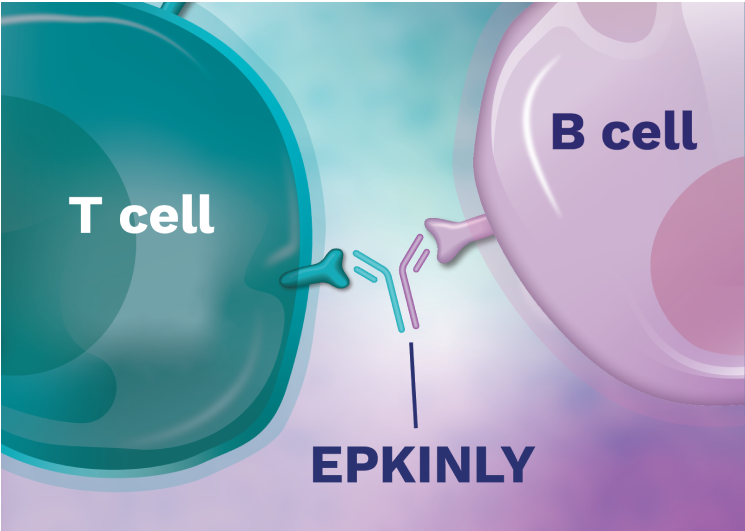How bispecific antibody therapy works
EPKINLY works by attaching to both your T cells and B cells, binding them together so that the T cells can attack and destroy B cells.
When you find out that your cancer has come back or hasn't responded after 2 or more types of treatment, you may be wondering what's next. Remission is still possible, and you have another option—one that is not chemotherapy or an infusion, and a treatment that you can start when you and your doctor are ready.

MY REASON WHY

How bispecific antibody therapy works
EPKINLY works by attaching to both your T cells and B cells, binding them together so that the T cells can attack and destroy B cells.
Some important things to keep in mind as you consider treatment

Your needs and priorities matter. You and your doctor can discuss these to help make treatment decisions.

Learn how quickly you may be able to start treatment.

You have support on your side. Keep your Care Partner and personal network involved as part of the decision-making process.

Learn more about EPKINLY for DLBCL treatment.
EPKINLY is a prescription medicine used to treat adults with certain types of diffuse large B-cell lymphoma (DLBCL), high-grade B-cell lymphoma, or follicular lymphoma (FL) that has come back or that did not respond to previous treatment after receiving 2 or more treatments. EPKINLY is approved based on patient response data. Studies are ongoing to confirm the clinical benefit of EPKINLY. It is not known if EPKINLY is safe and effective in children.
People with DLBCL or high-grade B-cell lymphoma should be hospitalized for 24 hours after receiving their first full dose of EPKINLY on day 15 of cycle 1 due to the risk of CRS and neurologic problems.
Tell your healthcare provider or get medical help right away if you develop a fever of 100.4°F (38°C) or higher; dizziness or lightheadedness; trouble breathing; chills; fast heartbeat; feeling anxious; headache; confusion; shaking (tremors); problems with balance and movement, such as trouble walking; trouble speaking or writing; confusion and disorientation; drowsiness, tiredness or lack of energy; muscle weakness; seizures; or memory loss. These may be symptoms of CRS or neurologic problems. If you have any symptoms that impair consciousness, do not drive or use heavy machinery or do other dangerous activities until your symptoms go away.
EPKINLY can cause other serious side effects, including:
Your healthcare provider will monitor you for symptoms of CRS, neurologic problems, infections, and low blood cell counts during treatment with EPKINLY. Your healthcare provider may temporarily stop or completely stop treatment with EPKINLY if you develop certain side effects.
Before you receive EPKINLY, tell your healthcare provider about all your medical conditions, including if you have an infection, are pregnant or plan to become pregnant, or are breastfeeding or plan to breastfeed. If you receive EPKINLY while pregnant, it may harm your unborn baby. If you are a female who can become pregnant, your healthcare provider should do a pregnancy test before you start treatment with EPKINLY and you should use effective birth control (contraception) during treatment and for 4 months after your last dose of EPKINLY. Tell your healthcare provider if you become pregnant or think that you may be pregnant during treatment with EPKINLY. Do not breastfeed during treatment with EPKINLY and for 4 months after your last dose of EPKINLY.
In DLBCL or high-grade B-cell lymphoma, the most common side effects of EPKINLY include CRS, tiredness, muscle and bone pain, injection site reactions, fever, stomach-area (abdominal) pain, nausea, and diarrhea. The most common severe abnormal laboratory test results include decreased white blood cells, decreased red blood cells, and decreased platelets.
In follicular lymphoma the most common side effects of EPKINLY include injection site reactions, CRS, COVID-19, tiredness, upper respiratory tract infections, muscle and bone pain, rash, diarrhea, fever, cough, and headache. The most common severe abnormal laboratory test results include decreased white blood cells and decreased red blood cells.
These are not all of the possible side effects of EPKINLY. Call your doctor for medical advice about side effects. You are encouraged to report side effects to the FDA at (800) FDA-1088 or www.fda.gov/medwatch or to Genmab US, Inc. at 1-855-4GENMAB (1‑855‑443‑6622).
Please see Medication Guide, including Important Warnings.
COM-US-EPK-0000771